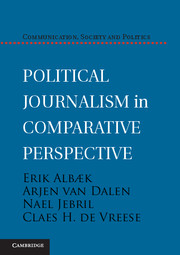Book contents
- Frontmatter
- Contents
- List of Tables and Figures
- Preface
- 1 Introduction
- 2 Comparing Political Journalism
- 3 Journalists
- 4 Journalists and Politicians
- 5 Do Role Conceptions Matter?
- 6 What Type of Journalism Produces Public Knowledge?
- 7 Does Infotainment Journalism Lead to Political Cynicism?
- 8 Good Journalism, Satisfied Citizens?
- 9 Political Journalism
- Appendix to Chapter 2
- Appendix to Chapter 3
- Appendix to Chapter 4
- Appendix to Chapter 5
- Appendix to Chapter 6
- Appendix to Chapter 7
- Appendix to Chapter 8
- References
- Index
1 - Introduction
Published online by Cambridge University Press: 05 June 2014
- Frontmatter
- Contents
- List of Tables and Figures
- Preface
- 1 Introduction
- 2 Comparing Political Journalism
- 3 Journalists
- 4 Journalists and Politicians
- 5 Do Role Conceptions Matter?
- 6 What Type of Journalism Produces Public Knowledge?
- 7 Does Infotainment Journalism Lead to Political Cynicism?
- 8 Good Journalism, Satisfied Citizens?
- 9 Political Journalism
- Appendix to Chapter 2
- Appendix to Chapter 3
- Appendix to Chapter 4
- Appendix to Chapter 5
- Appendix to Chapter 6
- Appendix to Chapter 7
- Appendix to Chapter 8
- References
- Index
Summary
Political journalists play a crucial role in a democracy. Democracy and journalism develop side by side, and a healthy democracy is characterized by free media and well-functioning journalists. Norris (2000, xv) writes that “journalism is often venerated as a beacon of light that helps to sustain democracy, a force for freedom lying between venal government and the citizens, a protector of the innocent.” The crucial word here is “often.” The role of journalism is not carved in stone, neither in terms of location nor time. The relationship between politics and journalism is evolving, and the news that journalists produce is under constant public and scientific scrutiny. Changes in society, journalism, and politics over the past decades have affected the nature of political communication systems. As argued by Blumler and Kavanagh (1999) more than a decade ago, power relationships among key message providers are shifting, the culture of political journalism is undergoing transformation, and conventional meanings of “democracy” and “citizenship” are being questioned and rethought. These changes raise questions about the nature of political journalism: Are political journalists and journalism similar across countries, or are they different? Does political journalism inform citizens? Does it help or hinder their engagement in politics? And what are the conditions under which political journalism functions optimally?
In the scholarly literature and public debate, some point to a positive impact of the news media on citizens’ knowledge and engagement in politics (e.g., Norris, 2000, Aarts & Semetko 2003). However, mostly negative views of news content dominate. Many believe in a current demise of news journalism, and most studies highlight the detrimental effects of that demise on citizens and democracy. Concerns are voiced about dominance in ownership structures, poor content, lack of good journalism, reliance on and misinterpretation of opinion polls, and ill-informed citizens who are losing interest in politics (e.g., Barnett & Gaber, 2001; Bennett, Lawrence, and Livingston, 2007; Blumler and Kavanagh, 1999; Cappella & Jamieson, 1997; McChesney, 1999; McNair, 2000a; Patterson, 1993, 2005).
- Type
- Chapter
- Information
- Political Journalism in Comparative Perspective , pp. 1 - 14Publisher: Cambridge University PressPrint publication year: 2014

